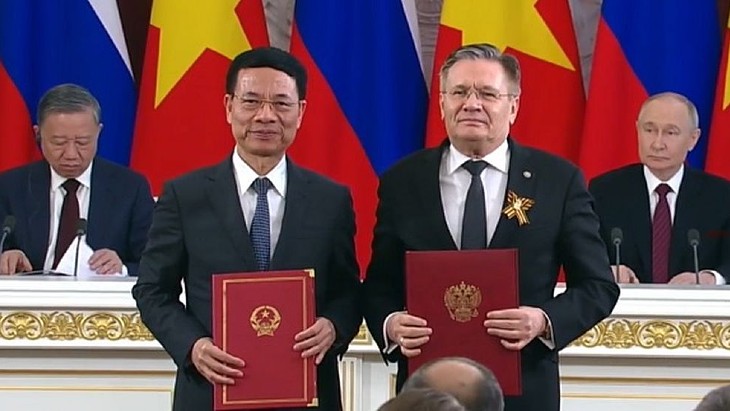During the meetings, an Interdepartmental Roadmap for Nuclear Technology Development to 2030 was signed which covers the construction of a nuclear science and technology centre featuring a research reactor as well as fuel supplies for the existing Dalat research reactor.
The document was signed by Rosatom Director General Alexey Likhachev and Vietnam's Science and Technology Minister Nguyen Manh Hung as part of a series of bilateral agreements announced during talks between Russian President Vladimir Putin and the General Secretary of Vietnam's Communist Party's Central Committee, To Lam.
The roadmap also covers workforce training and Vietnamese participation in the international research centre at the MBIR multipurpose sodium-cooled fast neutron research reactor which is under construction at the Research Institute of Atomic Reactors (RIAR) site at Dimitrovgrad, in Russia's Ulyanovsk region.
Likhachev said: "For many decades, the flagship of our cooperation has been work in the research field. In the 1980s, Soviet specialists restarted a research reactor built by the Americans (Dalat), and now Vietnamese specialists have ordered a new research reactor from us. We have already entered a site in the south of the country, in the province of Dong Gai, not far from Ho Chi Minh City. And a powerful, modern ... I think the best research reactor in Southeast Asia will soon appear there."
He added that the event also "marked the transition to a new stage of cooperation - a project to create a large nuclear power plant. We are offering our bestseller - the VVER-1200 reactor. Of course, negotiations must be held to clarify the technical appearance and financial support. These negotiations have started today. It would be a great honour and responsibility for us to build a flagship power reactor in Southeast Asia, but here we are at the very beginning of the journey".
The official joint statement after the talks said: "Both sides affirmed the importance of accelerating the project to build a Nuclear Science and Technology Centre in Vietnam as well as training Vietnamese students at educational institutions in Russia in the fields related to the use of atomic energy for peaceful purposes. Both sides emphasised the need to boost cooperation in renewable and clean energy development. Both sides agreed to expedite negotiations and the signing of intergovernmental agreements on the construction of nuclear power plants in Vietnam, using advanced technology and strictly complying with regulations on nuclear and radiation safety regulations, and for socio-economic development."
In February, Vietnam's Prime Minister Pham Minh Chinh instructed two state-owned groups to complete the construction of two nuclear power plants in the country by 2030. Vietnam had a previous nuclear energy programme, with a project in the central province of Ninh Thuan approved in principle in 2009 which was going to feature Russian VVER-1200 reactors, but project work was halted in 2016 because of "economic conditions". The National Assembly approved the government's proposal to restart that project in November last year.
In his comments to the media following the leaders' talks, Russia's president said: "Our cooperation in energy is expanding ... the agreements signed just now on the peaceful atom are opening doors to providing Vietnam with affordable and environmentally-safe energy. This project will become a good stimulus for the further growth of the Vietnamese economy, for the creation of thousands of new jobs, and the training of a highly qualified local workforce."
Vietnam's To Lam added: "We will work to develop new, substantial, and effective breakthroughs in scientific research and technology, nuclear energy, biotechnology, and the semiconductor industry. We also agreed to promote the implementation of joint research projects."





_55401.png)
_23009.jpg)

_33392.jpg)






